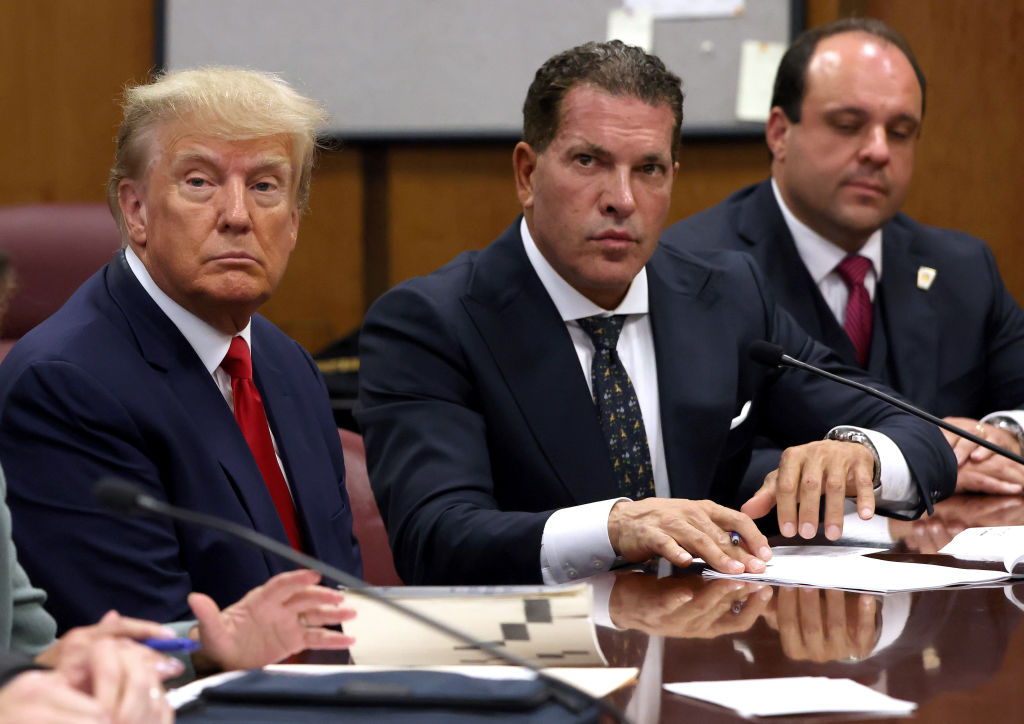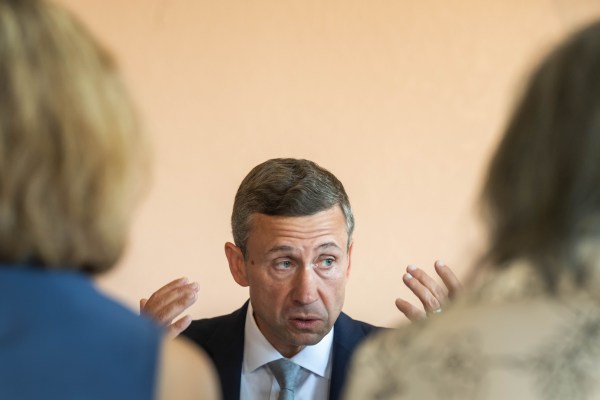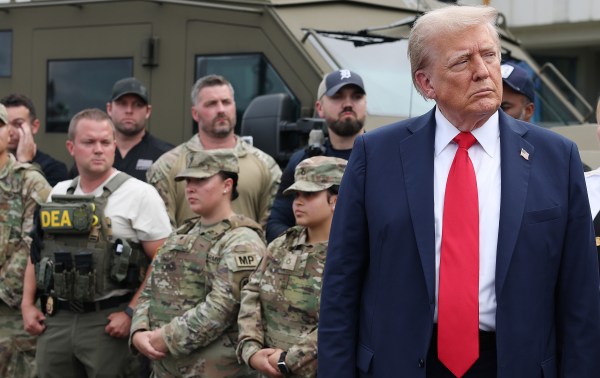Former President Donald Trump’s four criminal cases—two in state courts, two in federal courts, and all during the 2024 presidential election campaign, no less—will create daunting scheduling and logistics challenges. The way prosecutors, defense attorneys, and judges respond to those unprecedented challenges could set important legal precedent affecting presidents and campaigns for decades to come.
What are the cases against Trump?
The four sets of charges against Trump have come down in less than four months. Here’s a recap.
The first indictment, brought by Manhattan District Attorney Alvin Bragg, deals with the oldest alleged conduct: falsifying business records in New York in the course of making hush money payments to porn star Stormy Daniels prior to the 2016 election. Because it relies on a tenuous legal theory, Bragg’s case has been criticized across the political spectrum as the weakest of the four.
The second indictment is federal, brought by Department of Justice special counsel Jack Smith in the Southern District of Florida. It has to do with Trump’s mishandling of classified documents after his term as president ended.
The third indictment—also brought by special counsel Jack Smith, but this time in the District Court for the District of Columbia—has to do with conduct that occurred while Trump was still president. Smith has charged Trump with working with co-conspirators to attempt to overturn the results of the 2020 election and stay in office, defrauding the United States and obstructing a congressional proceeding—the January 6, 2021, certification of the Electoral College votes—in the process.
The fourth indictment—announced last week by Fani Willis, the district attorney of Fulton County, Georgia—charges Trump and 18 co-defendants with violation of Georgia’s racketeering law for conduct aimed at changing the 2020 election outcome there.
Much of the work between an indictment and a trial has to do with discovery—the “process by which the defendant and—to a more limited extent—the prosecutor can demand information and material about the case from the other party,” according to the FBI. Plus, both sides can submit motions to the judge. For example, “motions filed by the defense may seek to dismiss the charges, to suppress evidence, or to introduce specific evidence at trial,” while motions filed by the prosecution may try to keep in evidence that the defense wants excluded.
What conflicts might arise?
Calendar conflicts between attorneys, judges, and defendants are a fact of life in the criminal justice system. No well-established set of rules for dealing with them exists. “It really is just judges working things out amongst themselves in a professional sort of way,” says Andrew Guilford, who presided over more than 100 trials in his 14 years as a judge in the U.S. District Court for the Central District of California.
“A judge might say to the parties, ‘I want this case tried on February 14,’ and the parties will say ‘Judge, I already have a state court trial on that date.’ I think most judges would defer and not set it on the 14th,” Guilford explains. “But then there can be federal judges who say, ‘Counsel, with all due respect, this is a very important federal case, and my calendar is very busy and February 14 is the only day, go work it out with the other judge.’”
And it’s not just the trial date. Before, during, and after the trial itself, there will be hearings at which the defendant has a due process right to be present. For some hearings, Trump might be able to waive that right—but for court appearances, he may be required to show up on penalty of forfeiting a bond (which in the Georgia case amounts to $200,000).
The specific motions and hearings that come up in each of Trump’s cases will depend on the strategies the prosecutors and defense attorneys choose to pursue. Some of the processes will take longer than others. The Georgia case, for instance, with its sprawling RICO charges and 18 co-defendants, is expected to take up more time than the much more straightforward Mar-a-Lago documents case. But the four judges hearing the cases will have to determine their respective schedules as they continue to hear arguments from the parties.
Limiting factors in trial scheduling conflicts usually pertain to juggling the calendars of judges and attorneys. But Trump’s situation is unusual given his wide range of charges. Trump’s four indictments mean four trials under four judges with four teams of prosecutors and four sets of defense attorneys. That’s rare.
It’s not unheard of for a defendant to be tried in multiple jurisdictions at once. For example, a bank robbery could be tried at both the federal and state level—and a string of bank robberies in multiple states could be tried in each state. But in those examples, the underlying conduct is the same, and as a result the same defense attorneys would likely represent the defendant in each jurisdiction.
With Trump, “You’ve got at least three entirely different schemes,” says Mark Schamel, a criminal defense attorney based in Washington. “The tax fraud in New York is completely unrelated from the attempts to overthrow the government, and the attempts to overthrow the government are totally unrelated from the mishandling of classified documents.”
What arguments might the parties make?
In addition to the calendar math, there’s the matter of incentives: Trump’s defense attorneys want to do everything they can to slow the processes down, while the prosecutors want to move quickly.
That dynamic was on display over the last few days in the federal January 6 case. After prosecutors initially requested a trial in January 2024, Trump’s lawyers filed a motion arguing that the government’s evidence contains too much information for such a date to be feasible.
“Even assuming we could begin reviewing the documents today,” they wrote, “we would need to proceed at a pace of 99,762 pages per day to finish the government’s initial production by its proposed date for jury selection. That is the entirety of Tolstoy’s War and Peace, cover to cover, 78 times a day, every day, from now until jury selection.”
On Monday, special counsel Jack Smith replied that the defense’s request for an April 2026 trial “would deny the public its right to a speedy trial,” arguing that “the defendant cites inapposite statistics and cases, overstates the amount of new and non-duplicative discovery, and exaggerates the challenge of reviewing it effectively.”
Judge Tanya S. Chutkan is expected to rule on the trial date Monday.
The filings in the January 6 case over the last few days preview the kinds of arguments we could see in each case.
For example, both filings refer to the Speedy Trial Act, a 1974 federal statute that codified the right of a defendant to a speedy trial in the Sixth Amendment to the Constitution. The Speedy Trial Act dictates that a trial should generally commence within 70 days of an indictment. But Trump has waived that right, and his lawyers argue that “the public interest lies in justice and fair trial, not a rush to judgment.”
“The notion that the government may, with all its vast resources, spend years investigating this case, only to turn and demand the defense be prepared for jury selection in just four months defies all notions of fairness,” the defense team wrote.
Meanwhile, Smith continues to want to move swiftly, indicating in a Monday filing a willingness to be flexible with the calendar.
“The defense points out that the Government’s proposal to start jury selection on December 11, 2023, conflicts with a motions hearing in his criminal case in the Southern District of Florida,” Smith, who is also the special counsel for the Mar-a-Lago documents case, said in the filing. “Such true conflicts are easily addressed—the Government now proposes instead that jury selection begin later during the week of December 11 to accommodate the hearing date in the Florida case.”
“Through reasoned, discretionary scheduling orders like these, the Court can fairly administer the prompt disposition of this case,” he added.
How might judges resolve disputes?
Each prosecutorial team could argue why their case should get priority if they come into conflict. Manhattan District Attorney Alvin Bragg, for example, could argue that his charges were filed first and have to do with the oldest alleged conduct. Smith could say that the questions at issue in his cases are of national importance.
“‘Your honor, by the way, there’s five other presidents who have these documents and we want to make a clear statement: Don’t mess with this,’” Guilford says prosecutors in the documents case could tell a judge. Or in the cases related to the 2020 election, “‘We want to make a clear statement: Don’t mess with elections, especially with an approaching federal presidential election.’ Those are the kinds of arguments they would make.”
But ultimately, it’s up to the judges to make scheduling decisions. And while the judges can talk to each other to work out conflicts themselves, they’ll want to avoid any appearance of making decisions about Trump without him or his lawyers present.
“They might have the ability to make phone calls,” Guilford says. “But then you have a problem that that’s a communication that the parties aren’t participating in, and that’s not a good idea.”
Some judges might be inclined to think that federal cases trump state cases, but that’s by no means a hard and fast rule. Similarly, routine trial calendar conflicts might sometimes be sorted out by seniority, with longer-tenured judges getting priority—but that kind of determination would usually happen within the same district, not across the wide array of jurisdictions Trump has been charged in.
Regardless of how they choose to approach it, the fact that the judges are making rulings in the trials of a former president is significant in itself. Whatever ends up happening in each of the four cases, they may make future, politically tinged attempts to indict presidents and presidential candidates more likely.
“Some might say, ‘Well, it’s not that easy to indict,’” Guilford tells The Dispatch. “But the joke is that you can indict a ham sandwich.”






Please note that we at The Dispatch hold ourselves, our work, and our commenters to a higher standard than other places on the internet. We welcome comments that foster genuine debate or discussion—including comments critical of us or our work—but responses that include ad hominem attacks on fellow Dispatch members or are intended to stoke fear and anger may be moderated.
With your membership, you only have the ability to comment on The Morning Dispatch articles. Consider upgrading to join the conversation everywhere.